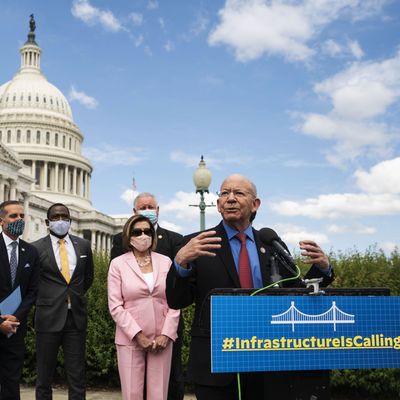
The attempt to secure a bipartisan infrastructure bill has lived a short, pointless life, and it’s time now to put that little critter to rest.
For weeks, the White House and Senate Republicans have been negotiating over a plan for rebuilding American infrastructure. These efforts were suspect from the start. The notion that Mitch McConnell’s caucus would hand a Democratic president a major legislative victory on a high-visibility issue — and thus insulate him against charges of excessive partisanship — never made much sense. Nevertheless, there was initially some logic to Joe Biden’s pursuit of a bipartisan deal.
American voters do like bipartisanship as an abstract concept. And after the Democratic leadership strong-armed Joe Manchin into backing a partisan $1.9 trillion stimulus package, Biden likely needed to make a gesture at bipartisanship in order to secure the West Virginia senator’s future cooperation. What’s more, if Biden could get Republicans to agree on any infrastructure spending, he could pocket the win (and his bipartisanship merit badge) and then undo every concession he made in a subsequent budget-reconciliation bill.
If the near-certain folly of bipartisan infrastructure negotiations was once worthwhile, however, it is no longer. Legislative calendar is a precious commodity. And Democrats may have even less time to enact their agenda than they realize. On average, ten lawmakers have died in each two-year Congress. Chuck Schumer’s bare majority rests on the health of several senior citizens in states where Republican governors have the power to fill vacant Senate seats. Biden can’t afford to waste more than a month on a charade — which is what the infrastructure negotiations have become.
The fundamental obstacle to a deal on infrastructure is financing. There are other massive hurdles, including the size of the package. But in principle, there are discrete forms of infrastructure that Republicans and Democrats both deem worthwhile. Given that Biden still has multiple reconciliation bills in his quiver, he might be able to get progressives to swallow a modest bipartisan package in exchange for assurances on the content of future legislation.
The insuperable problem is that, however unwisely, Biden and the GOP both believe an infrastructure bill should be “paid for.” And Republicans are religiously opposed to financing public spending with tax hikes on the wealthy or corporations. Instead, they propose funding roads and bridges by redirecting existing federal spending and/or imposing taxes on drivers. Biden, meanwhile, is politically committed to not raising taxes on Americans who earn under $400,000 a year. There is no way around this impasse. Last week, in a memo to top Republican negotiator Shelley Moore Capito, Biden reiterated his commitment to paying for the plan with a corporate tax hike. In a statement on Friday, Capito’s office said, “There continue to be vast differences between the White House and Senate Republicans when it comes to the definition of infrastructure, the magnitude of proposed spending, and how to pay for it. Based on today’s meeting, the groups seem further apart after two meetings with White House staff than they were after one meeting with President Biden.”
This statement seems intended to suggest that Biden’s crypto-socialist staffers are getting in the way of an eminently achievable compromise between the old man and Senate Republicans. But it should be read as a declaration of futility.
The gap between the GOP and the White House is unbridgeable. And the time for pretending otherwise is up.






























